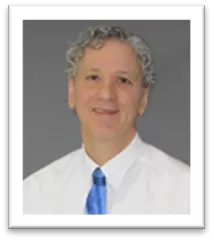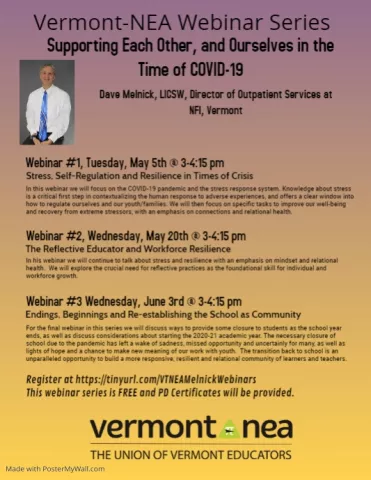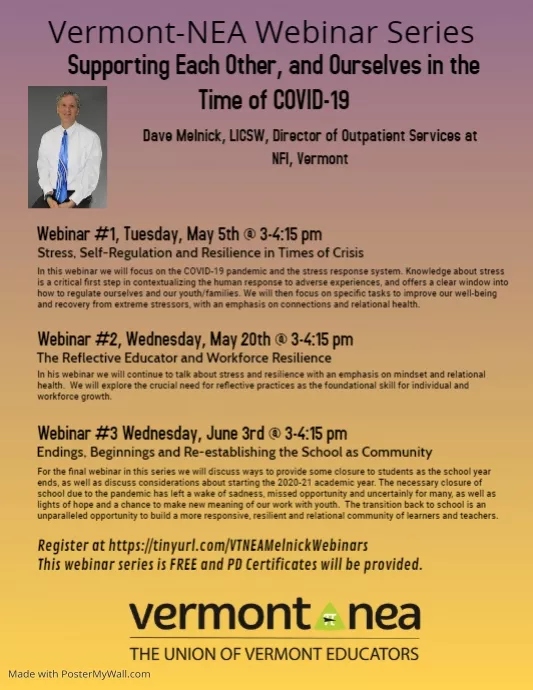2020 COVID-19 Webinar Series with Dave Melnick: Stress Mitigation, Transforming Trauma, and Re-establishing School as Community
Whether we begin school remotely or in-person this fall, we will need to focus on the social-emotional wellbeing of all our students. Please join fellow educators for a free webinar series on healing stress and trauma, and how to establish core capacities for transforming trauma in schools during the unprecedented COVID-19 pandemic. Funded by NEA, this series is co-sponsored by affiliates in Vermont, Maine, New Hampshire, Connecticut, and Rhode Island.
The Educator Mindset: Stress, Stress Mitigation and Resilience in Times of Community Crisis
Click here to view webinar #1: 2.0 hours in duration
Click here to view webinar #2: 2.0 hours in duration
In Webinar #1 and continuing in Webiar #2 we will examine how our mindsets, both implicit and explicit, are driving forces of our actions, interpretations, and perceptions, particularly when working in high stress situations with students. Mindsets are beliefs and assumptions that help us organize and categorize our lived experience and they are taught, nurtured, implied, and assimilated into our thinking, often very early in our lives. Many of our most impactful mindsets originate in our physiological system, in pre-conscious forms, and it is critical to our work that we deconstruct and examine these beliefs. This is particularly true regarding mindsets related to race, gender, sexual orientation, other “isms” and disciplining children, and warrant especially critical self-inquiry. Webinar content will also focus on stress, traumatic stress, and the unique challenges of living and working through the COVID-19 pandemic. We will examine the three premises for trauma-informed schools and study the stress response system. Finally, a 4-phase model of restoring well-being during the pandemic and other times of adversity will be offered.
The Core Capacities to Transform Trauma in Schools: The Healing Community
Click here to view webinar #3: 2.0 hours in duration
Click here to view webinar #4: 2.0 hours in duration
In Webinar #3 and continuing in Webinar #4 we take a comprehensive look into strategies that help to build healing and resilience practices in schools. These include Reflective Practices, Restorative Practices, Reframing, Stress Mitigation and other SEL skills. Our model of promoting resilience in schools recognizes that sustainable change requires top down, bottom up and lateral implementation of these practices. They require close partnership between and amongst administrators, workforce, students and families, and rest on the notion that resilience is largely relational. When we prioritize and resource high quality relationships on all these levels, the work of schools thrives. The trauma-informed schools model also rests on the belief that SEL skills are not “soft skills” but essential human skills necessary for excellence, growth, and positive change.
Re-establishing the School as Community and the Six Drivers of Change
Click here to view webinar #5: 2.0 hours in duration
For the final webinar in this series, we will discuss ways to integrate new knowledge acquired from remote learning into the 2020-21 academic year. The necessary closure of school due to the pandemic has left a wake of sadness, missed opportunity and uncertainty for many, as well as lights of hope and a chance to make new meaning of our work with youth. The transition back to school is an unparalleled opportunity to build a more responsive, equitable, resilient, and relational community of learners and teachers. To implement change, particularly those related to trauma-informed schools, fidelity to an implementation plan and the 6 Drivers of Change will be considered.

Dave Melnick, LICSW is the Director of Outpatient Services at NFI, Vermont, a statewide mental health agency primarily serving children, adolescents, and families. For the past 30 years, Dave has worked in a variety of settings including outpatient, residential treatment, and in public and day treatment schools. Along with his focus on Developmental Trauma, Dave has expertise in family therapy, adolescence, attachment, and Trauma-informed Schools. He is trained in EMDR, DDP, and a variety of family systems models. In 2015, the Child Trauma Academy (CTA) acknowledged that Dave had completed NMT Training Certification through the Phase II level, and in April 2017, he was selected as a Fellow at the CTA.
Dave received his Master’s degree in social welfare from UC Berkeley in 1988, and he has been an adjunct instructor at the University of Vermont. Dave is licensed in both the state of Vermont and New York as a clinical social worker. Dave teaches graduate classes for the Vermont Higher Education Collaboration and is a much-in-demand presenter and consultant in Vermont, New York and Canada.
Use Your Educator Voice.


